高考英语语法复习词性转换构词法真题练习含解析北师大版
- 格式:doc
- 大小:50.04 KB
- 文档页数:5

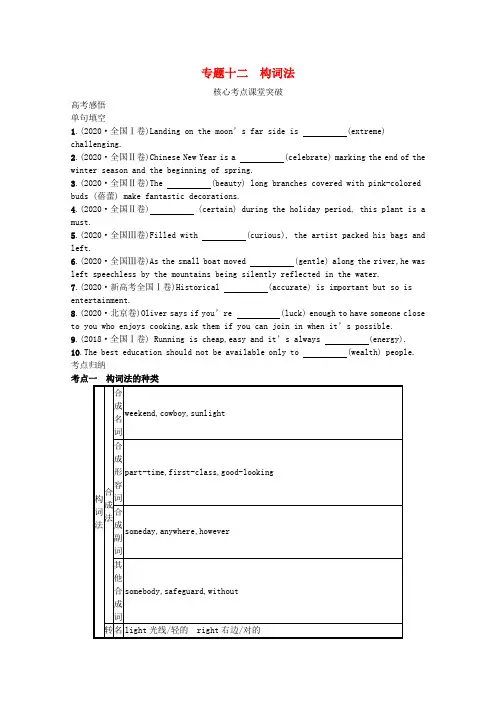
专题十二构词法核心考点课堂突破高考感悟单句填空1.(2020·全国Ⅰ卷)Landing on the moon’s far side is (extreme) challenging.2.(2020·全国Ⅱ卷)Chinese New Year is a (celebrate) marking the end of the winter season and the beginning of spring.3.(2020·全国Ⅱ卷)The (beauty) long branches covered with pink-colored buds (蓓蕾) make fantastic decorations.4.(2020·全国Ⅱ卷) (certain) during the holiday period, this plant is a must.5.(2020·全国Ⅲ卷)Filled with (curious), the artist packed his bags and left.6.(2020·全国Ⅲ卷)As the small boat moved (gentle) along the river,he was left speechless by the mountains being silently reflected in the water.7.(2020·新高考全国Ⅰ卷)Historical (accurate) is important but so is entertainment.8.(2020·北京卷)Oliver says if you’re (luck) enough to have someone close to you who enjoys cooking,ask them if you can join in when it’s possible.9.(2018·全国Ⅰ卷) Running is cheap,easy and it’s always (energy).10.The best education should not be available only to (wealth) people. 考点归纳考点一构词法的种类考点二合成法合成法就是由两个或更多的词合成一个词。
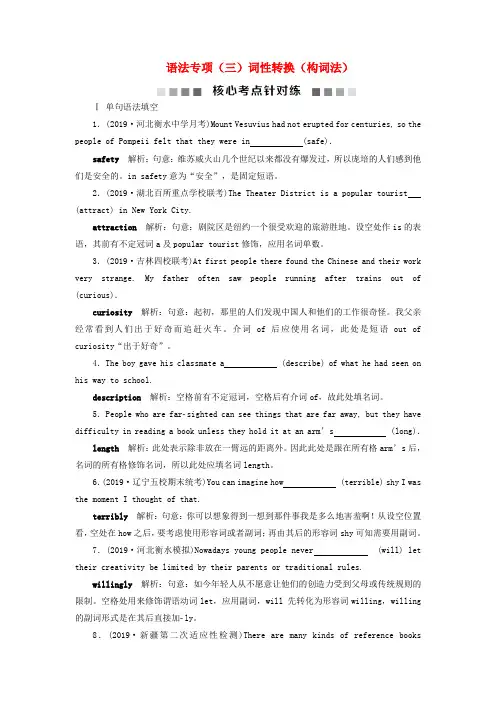
语法专项(三)词性转换(构词法)Ⅰ单句语法填空1.(2019·河北衡水中学月考)Mount Vesuvius had not erupted for centuries, so thepeople of Pompeii felt that they were in (safe).safety解析:句意:维苏威火山几个世纪以来都没有爆发过,所以庞培的人们感到他们是安全的。
in safety意为“安全”,是固定短语。
2.(2019·湖北百所重点学校联考)The Theater District is a popular tourist (attract) in New York City.attraction解析:句意:剧院区是纽约一个很受欢迎的旅游胜地。
设空处作is的表语,其前有不定冠词a及popular tourist修饰,应用名词单数。
3.(2019·吉林四校联考)At first people there found the Chinese and their workvery strange. My father often saw people running after trains out of (curious).curiosity解析:句意:起初,那里的人们发现中国人和他们的工作很奇怪。
我父亲经常看到人们出于好奇而追赶火车。
介词of后应使用名词,此处是短语out ofcuriosity“出于好奇”。
4.The boy gave his classmate a (describe) of what he had seen onhis way to school.description解析:空格前有不定冠词,空格后有介词of,故此处填名词。
5.People who are farsighted can see things that are far away, but they havedifficulty in reading a book unless they hold it at an arm’s (long).length解析:此处表示除非放在一臂远的距离外。
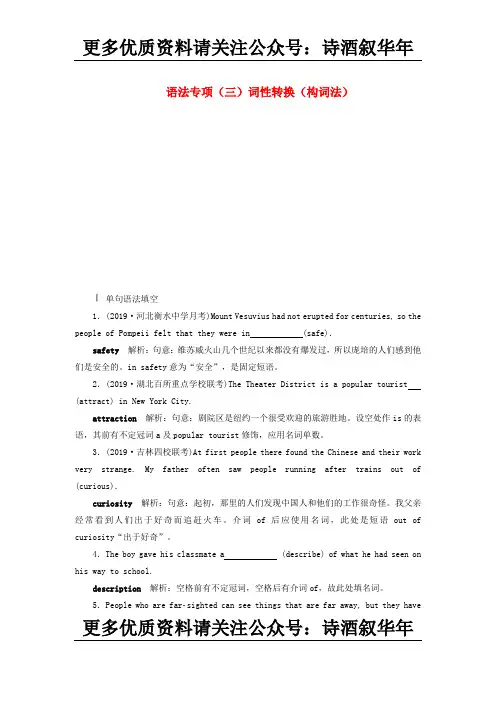
语法专项(三)词性转换(构词法)Ⅰ单句语法填空1.(2019·河北衡水中学月考)Mount Vesuvius had not erupted for centuries, so thepeople of Pompeii felt that they were in (safe).safety解析:句意:维苏威火山几个世纪以来都没有爆发过,所以庞培的人们感到他们是安全的。
in safety意为“安全”,是固定短语。
2.(2019·湖北百所重点学校联考)The Theater District is a popular tourist (attract) in New York City.attraction解析:句意:剧院区是纽约一个很受欢迎的旅游胜地。
设空处作is的表语,其前有不定冠词a及popular tourist修饰,应用名词单数。
3.(2019·吉林四校联考)At first people there found the Chinese and their workvery strange. My father often saw people running after trains out of (curious).curiosity解析:句意:起初,那里的人们发现中国人和他们的工作很奇怪。
我父亲经常看到人们出于好奇而追赶火车。
介词of后应使用名词,此处是短语out ofcuriosity“出于好奇”。
4.The boy gave his classmate a (describe) of what he had seen onhis way to school.description解析:空格前有不定冠词,空格后有介词of,故此处填名词。
5.People who are farsighted can see things that are far away, but they have更多优质资料请关注公众号:诗酒叙华年difficulty in reading a book unless they hold it at an arm’s (long).length解析:此处表示除非放在一臂远的距离外。

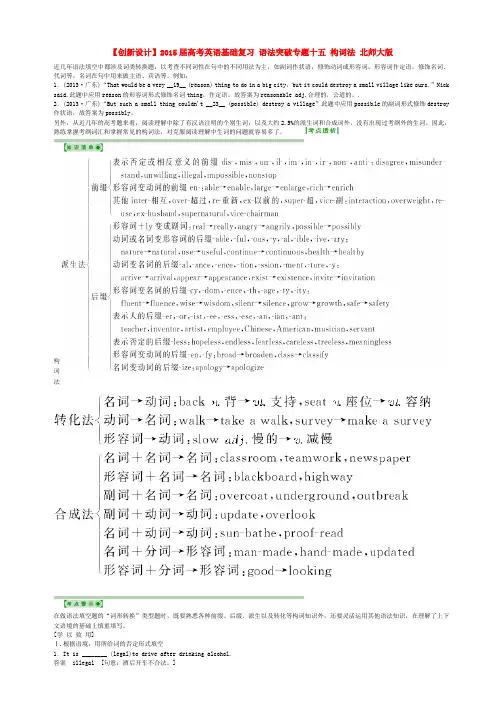
【创新设计】2015届高考英语基础复习语法突破专题十五构词法北师大版近几年语法填空中都涉及词类转换题,以考查不同词性在句中的不同用法为主,如副词作状语,修饰动词或形容词,形容词作定语,修饰名词、代词等,名词在句中用来做主语、宾语等。
例如:1.(2013·广东)“That would be a very __19__ (reason) thing to do in a big city,but it could destroy a small village like ours.”Nick said.此题中应用reason的形容词形式修饰名词thing,作定语,故答案为reasonable adj.合理的,公道的。
2.(2013·广东)“But such a small thing couldn't __23__ (possible) destroy a village”此题中应用possib le的副词形式修饰destroy 作状语,故答案为possibly。
另外,从近几年的高考题来看,阅读理解中除了有汉语注明的个别生词,以及大约2.5%的派生词和合成词外,没有出现过考纲外的生词。
因此,熟练掌握考纲词汇和掌握常见的构词法,对克服阅读理解中生词的问题就容易多了。
构词法在做语法填空题的“词形转换”类型题时,既要熟悉各种前缀、后缀、派生以及转化等构词知识外,还要灵活运用其他语法知识,在理解了上下文语境的基础上慎重填写。
[学以致用]Ⅰ.根据语境,用所给词的否定形式填空1.It is ________ (legal)to drive after drinking alcohol.答案illegal [句意:酒后开车不合法。
]2.________ (lead)advertisements are not allowed by law.答案Misleading [句意:误导的广告为法律所不允许。
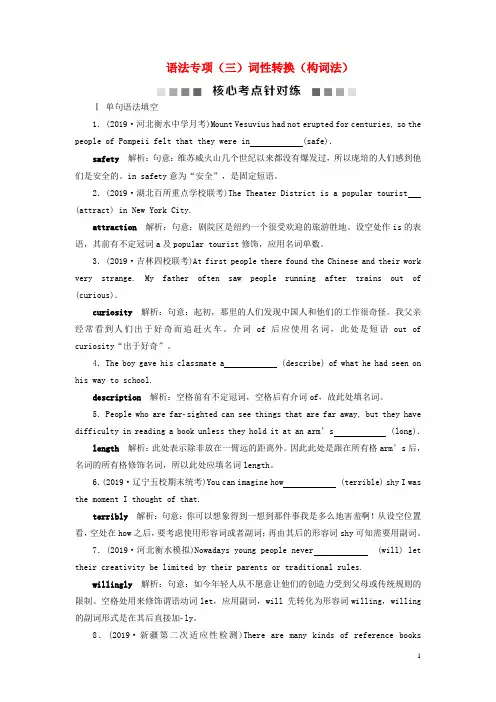
语法专项(三)词性转换(构词法)Ⅰ单句语法填空1.(2019·河北衡水中学月考)Mount Vesuvius had not erupted for centuries, so thepeople of Pompeii felt that they were in (safe).safety解析:句意:维苏威火山几个世纪以来都没有爆发过,所以庞培的人们感到他们是安全的。
in safety意为“安全”,是固定短语。
2.(2019·湖北百所重点学校联考)The Theater District is a popular tourist (attract) in New York City.attraction解析:句意:剧院区是纽约一个很受欢迎的旅游胜地。
设空处作is的表语,其前有不定冠词a及popular tourist修饰,应用名词单数。
3.(2019·吉林四校联考)At first people there found the Chinese and their workvery strange. My father often saw people running after trains out of (curious).curiosity解析:句意:起初,那里的人们发现中国人和他们的工作很奇怪。
我父亲经常看到人们出于好奇而追赶火车。
介词of后应使用名词,此处是短语out ofcuriosity“出于好奇”。
4.The boy gave his classmate a (describe) of what he had seen onhis way to school.description解析:空格前有不定冠词,空格后有介词of,故此处填名词。
5.People who are farsighted can see things that are far away, but they havedifficulty in reading a book unless they hold it at an arm’s (long).length解析:此处表示除非放在一臂远的距离外。
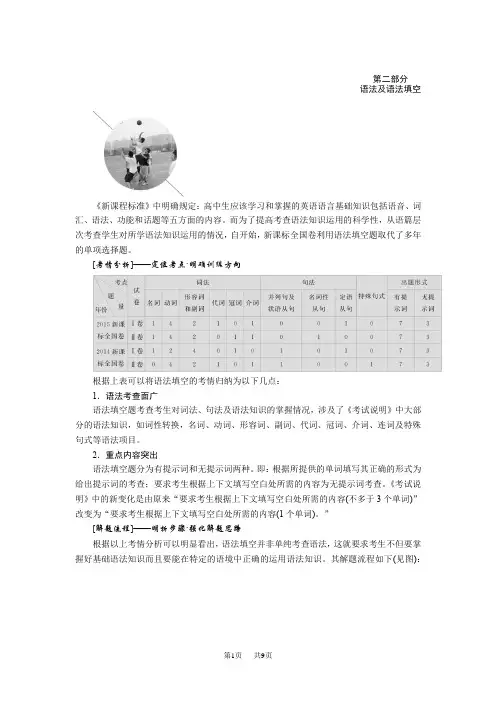
第二部分语法及语法填空《新课程标准》中明确规定:高中生应该学习和掌握的英语语言基础知识包括语音、词汇、语法、功能和话题等五方面的内容。
而为了提高考查语法知识运用的科学性,从语篇层次考查学生对所学语法知识运用的情况,自开始,新课标全国卷利用语法填空题取代了多年的单项选择题。
[考情分析]——定位考点·明确训练方向根据上表可以将语法填空的考情归纳为以下几点:1.语法考查面广语法填空题考查考生对词法、句法及语法知识的掌握情况,涉及了《考试说明》中大部分的语法知识,如词性转换,名词、动词、形容词、副词、代词、冠词、介词、连词及特殊句式等语法项目。
2.重点内容突出语法填空题分为有提示词和无提示词两种。
即:根据所提供的单词填写其正确的形式为给出提示词的考查;要求考生根据上下文填写空白处所需的内容为无提示词考查。
《考试说明》中的新变化是由原来“要求考生根据上下文填写空白处所需的内容(不多于3个单词)”改变为“要求考生根据上下文填写空白处所需的内容(1个单词)。
”[解题流程]——明析步骤·强化解题思路根据以上考情分析可以明显看出,语法填空并非单纯考查语法,这就要求考生不但要掌握好基础语法知识而且要能在特定的语境中正确的运用语法知识。
其解题流程如下(见图):为提高学生的解题能力和正确率,下面对基础语法知识及其在语法填空题中的运用技巧进行系统的讲解。
第一讲词性转换PartⅠ真题变式体验1.[2015·福建高考]It was ________ (consider) of Michael to inform us of his delay in case we got worried.答案:considerate根据空格位置在系动词之后可以判断,应填consider的形容词considerate“体贴的,考虑周到的”。
2.[2015·安徽高考]They gave money to the old people's home either________ (person) or through their companies.答案:personally根据结构与through their companies并列,可知此处填person的副词personally“亲自”。
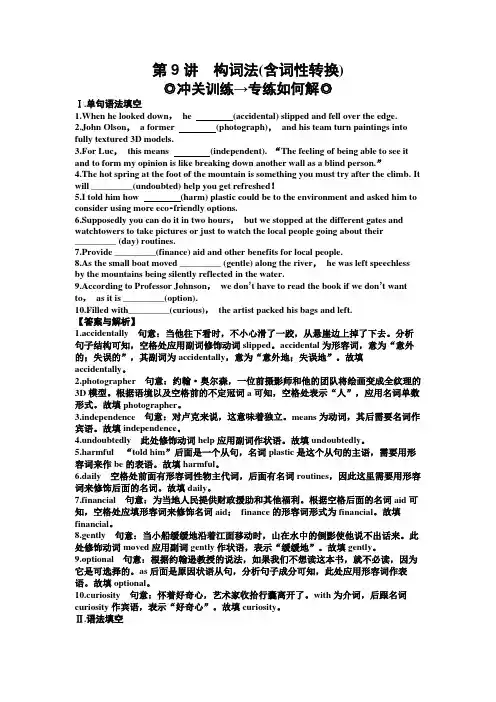
第9讲构词法(含词性转换)◎冲关训练→专练如何解◎Ⅰ.单句语法填空1.When he looked down,he (accidental) slipped and fell over the edge.2.John Olson,a former (photograph),and his team turn paintings into fully textured 3D models.3.For Luc,this means (independent). “The feeling of being able to see it and to form my opinion is like breaking down another wall as a blind person.”4.The hot spring at the foot of the mountain is something you must try after the climb. It will _________(undoubted) help you get refreshed!5.I told him how (harm) plastic could be to the environment and asked him to consider using more eco⁃friendly options.6.Supposedly you can do it in two hours,but we stopped at the different gates and watchtowers to take pictures or just to watch the local people going about their_________ (day) routines.7.Provide _________(finance) aid and other benefits for local people.8.As the small boat moved _________ (gentle) along the river,he was left speechless by the mountains being silently reflected in the water.9.According to Professor Johnson,we don’t have to read the book if we don’t want to,as it is _________(option).10.Filled with_________(curious),the artist packed his bags and left.【答案与解析】1.accidentally句意:当他往下看时,不小心滑了一跤,从悬崖边上掉了下去。
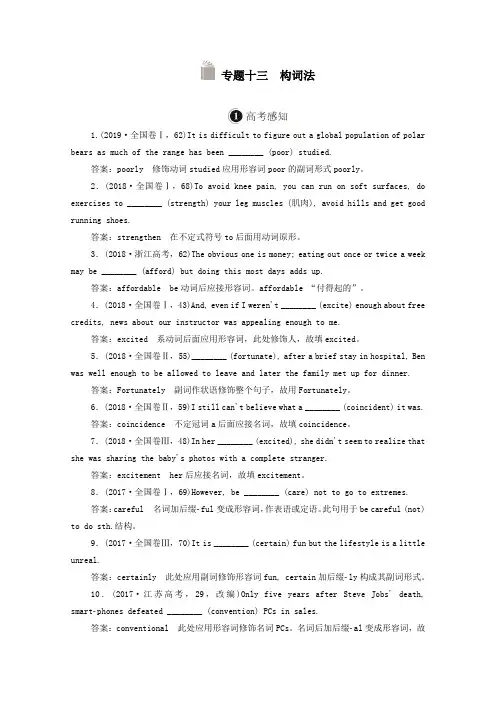
专题十三构词法1.(2019·全国卷Ⅰ,62)It is difficult to figure out a global population of polar bears as much of the range has been ________ (poor) studied.答案:poorly 修饰动词studied应用形容词poor的副词形式poorly。
2.(2018·全国卷Ⅰ,68)To avoid knee pain, you can run on soft surfaces, do exercises to ________ (strength) your leg muscles (肌肉), avoid hills and get good running shoes.答案:strengthen 在不定式符号to后面用动词原形。
3.(2018·浙江高考,62)The obvious one is money; eating out once or twice a week may be ________ (afford) but doing this most days adds up.答案:affordable be动词后应接形容词。
affordable “付得起的”。
4.(2018·全国卷Ⅰ,43)And, even if I weren't ________ (excite) enough about free credits, news about our instructor was appealing enough to me.答案:excited 系动词后面应用形容词,此处修饰人,故填excited。
5.(2018·全国卷Ⅱ,55)________ (fortunate), after a brief stay in hospital, Ben was well enough to be allowed to leave and later the family met up for dinner.答案:Fortunately 副词作状语修饰整个句子,故用Fortunately。

必修一Unit3 topic talk1.occasion n.重要的社交活动;时刻→occasional adj偶尔的;偶然的→occasionally adv 偶尔,有时2.graduate v 毕业n毕业生→graduation n.毕业3.congratulate vt.祝贺→congratulation n.恭喜,祝贺4.decorate vi.& vt装饰置美化→decoration n.装饰物5.tradition n.传统→traditional adj.传统的,守旧的→traditionally adv 传统上cultural tradition 文化传统必修一Unit3 lesson11.immediate adj.立即的→immediately adv 即刻,马上2.summarise vi& vt总结→summary n.总结;概括adj概括的3.sweep v.扫;打扫sweep-swept-swept4.attach v.贴;固定;附上→attached adj.附着的;喜欢的→attachment n.附件,附属品5.expect v 期望→expectant adj期待的期望的→expectation n.预期,期待6.scare vt.吓唬;使(某人)惊恐→scared adi害怕的→ scary adj令人害怕的播7.surround vt.环绕,围绕→surrounding adj周围的一surroundings n周围的事物,环境be surrounded by/with 被··...·包围/环绕8.retiren v.退休→ retired adj退休的→ retirement n.退休,退休生活9.joy n.欢欣→ joyful adj.欢喜的;令人高兴的→ joyfully adv高兴地,喜悦地10.origin n.起源→original adj.原先的,最早的→originally adv 本来,原来构词小练习1.n.活动;时刻,时候→ adj偶尔的;偶然的→ adv偶尔有时2.n.毕业生,v.毕业→ n..毕业3.vt.祝贺→ n.恭喜,祝贺4.vi.& vt装饰置美化→ n.装饰物5.n.传统→ adj.传统的,守旧的→ adv传统上6.adj.立即的→ adv 即刻,马上7.vi& vt总结→ n.总结;概括adj概括的8.v.扫;打扫sweep--9.v.贴;固定;附上→ adj;.附着的;喜欢的→ n.附件,附属品10.v 期望→ adj期待的期望的→ n.预期,期待11.vt.吓唬;使(某人)惊恐→ adi害怕的→ adj令人害怕的12.vt.环绕,围绕→ adj周围的一n周围的事物,环境13.v.退休→ adj退休的→ n.退休,退休生活14.n.欢欣→ adj.欢喜的;令人高兴的→ adv高兴地,喜悦地15.n.起源→ adj.原先的,最早的→ adv 本来,原来。
高考英语一轮复习学案北师大版:第五讲词性转换单句语法填空1.(2020·北京卷)Because of the confidence she inspired in me,I've carved out a ________(success)profession as a journalist.解析:考查词性转换。
profession 为名词,意为“职业”,故应用形容词修饰名词,故填successful。
答案:successful2.(2020·新高考山东卷)In the 18th and 19th centuries,________(wealth)people travelled and collected plants,historical objects and works of art.解析:考查词性转换。
根据设空处后面的名词people可知,这里应用形容词wealthy 修饰。
答案:wealthy3.(2020·新高考山东卷)Historical ________(accurate)is important but so is entertainment.解析:考查名词。
根据语境和设空处前的修饰词Historical可知,此处应用名词accuracy作主语。
答案:accuracy4.(2020·全国卷Ⅲ)As the small boat moved ________(gentle)along the river he was left speechless by the mountains being silently reflected in the water.解析:考查词性转换。
修饰动词moved应使用副词。
答案:gently5.(2019·全国卷Ⅱ)But then we got an official letter and we were blown away.We are so proud of her.It's________(wonder).解析:考查词性转换(名词变形容词)。
专题十四构词法1.(2021·全国乙卷,61,62)It is different from traditional tourism because itallows the traveler to become (educate) about the areas—both in termsof geographical conditions and cultural characteristics, and often provides moneyfor conservation and benefits the (develop) of the local areas.答案:educated; development 第一空在系动词become后应用形容词作表语,educated“受过教育的,有教养的”。
第二空在冠词the之后,应用名词development。
2.(2021·新高考Ⅰ卷,58)It will (undoubted) help you get refreshed!答案:undoubtedly 此处应用副词作状语修饰谓语动词help,意为“无疑地”,应用副词形式。
故填undoubtedly。
3.(2021·全国乙卷,68)Provide (finance) aid and other benefits forlocal peoples.答案:financial 设空处在名词aid之前,应用形容词作定语,financial “财政的”。
4.(2021·新高考Ⅰ卷,60)But that's how nature is—always leaving us (astonish).答案:astonished 此句中含有“leave sb/sth+adj.”结构,表示“使……处于某种状态”。
宾语为us,应用形容词astonished作宾语补足语,说明人的感受,意为“吃惊的”。
构词法一、合成法1.复合名词的主要构成方式2.3.复合动词的主要构成方式二、转化法三、派生法1.前缀构词法(1)名词后缀able/ible/unbelievable不可信的bleal national国家的;continental大陆的ed learned有学识的;talented有才华的en golden金色的;woolen毛(织)的ful beautiful美丽的;useful有用的ic/ical economic经济的;political政治的ish childish幼稚的;selfish自私的ive creative有创造力的less useless无用的;careless粗心的ly friendly友好的;deadly致命的ous/ious dangerous危险的;glorious光荣的ward downward向下的y rainy多雨的;noisy吵闹的(3)动词后缀后缀例词en(使变得) deepen加深fy(使……化) simplify简化ize/ise(使……变成……)realiz(s)e实现;industrializ(s)e使工业化(4)副词后缀后缀例词carefully小心地;beautifully美丽地;quickly迅ly速地ward(s)forward向前;backwards向后用所给词的适当形式填空1.Her preparation course is helping her to get used to ________(academy) requirements of a Western university.2.A fireman ________(accident) discovered the cause of the fire.3.It cost ________(approximate) 300—I can’t remember it exactly.4.________(beg) can’t be choosers.5.Other disabled people find the website ________(benefit) because they can read about people with similar difficulties to their own.6.She glanced ________(casual) through a magazine as she waited.7.The two of them are in a ________(compare) financial situation.8.He quit playing ________(compete) football at the age of 24.9.Man’s social being determines his ________(conscious).10.The café has a relaxed ________(continent) feel about it.答案领悟语法1.academic 2.accidentally 3.approximately 4.Beggars5.beneficial 6.casually 7 parable 8 petitive 9.consciousness 10.continental。
语法专项(三)词性转换(构词法)Ⅰ单句语法填空1.(2019·河北衡水中学月考)Mount Vesuvius had not erupted for centuries, so thepeople of Pompeii felt that they were in (safe).safety解析:句意:维苏威火山几个世纪以来都没有爆发过,所以庞培的人们感到他们是安全的。
in safety意为“安全”,是固定短语。
2.(2019·湖北百所重点学校联考)The Theater District is a popular tourist (attract) in New York City.attraction解析:句意:剧院区是纽约一个很受欢迎的旅游胜地。
设空处作is的表语,其前有不定冠词a及popular tourist修饰,应用名词单数。
3.(2019·吉林四校联考)At first people there found the Chinese and their workvery strange. My father often saw people running after trains out of (curious).curiosity解析:句意:起初,那里的人们发现中国人和他们的工作很奇怪。
我父亲经常看到人们出于好奇而追赶火车。
介词of后应使用名词,此处是短语out ofcuriosity“出于好奇”。
4.The boy gave his classmate a (describe) of what he had seen onhis way to school.description解析:空格前有不定冠词,空格后有介词of,故此处填名词。
5.People who are farsighted can see things that are far away, but they havedifficulty in reading a book unless they hold it at an arm’s (long).length解析:此处表示除非放在一臂远的距离外。
因此此处是跟在所有格arm’s后,名词的所有格修饰名词,所以此处应填名词length。
6.(2019·辽宁五校期末统考)You can imagine how (terrible) shy I wasthe moment I thought of that.terribly解析:句意:你可以想象得到一想到那件事我是多么地害羞啊!从设空位置看,空处在how之后,要考虑使用形容词或者副词;再由其后的形容词shy可知需要用副词。
7.(2019·河北衡水模拟)Nowadays young people never (will) lettheir creativity be limited by their parents or traditional rules.willingly解析:句意:如今年轻人从不愿意让他们的创造力受到父母或传统规则的限制。
空格处用来修饰谓语动词let,应用副词,will 先转化为形容词willing,willing的副词形式是在其后直接加ly。
8.(2019·新疆第二次适应性检测)There are many kinds of reference booksavailable in the book market. A smart use of these books is certainly (benefit), but the misuse and overuse of them may cause a lot of problems.beneficial解析:考查形容词。
此处应用形容词作系动词is的表语。
9.(2019·湖北武汉高三调考)Floating on a pool of water at the base and lookingup at the waterfall with a background of blue sky was one of the most (relax) experiences of my life.relaxing解析:名词前应用形容词作定语,此处修饰experiences,故填relaxing“令人放松的”。
10.(2019·安徽师大附中测试)What a wonderful example these two elderly sisterswere to me! I will always be (thank) that I had the opportunity to knowthem.thankful解析:考查形容词。
be动词后一般跟形容词作表语,故此处应用形容词形式。
Ⅱ单句改错1.(2019·吉林长春外国语学校期中)I will be fully occupied in preparing for animportance lecture coming the day after tomorrow.importance→important解析:句意:我将忙着准备后天的一个重要的演讲。
根据该句中的名词lecture可知,应用形容词important修饰lecture,表示“重要的演讲”。
2.(2019·广东湛江模拟)Eventually, members of the English club will exchangegifts. I’m sure it will be a warmly gettogether.warmly→warm解析:此处修饰名词gettogether应用形容词warm。
3.(2019·沈阳监测)Passing through several streets, we saw no one but onlyrubbish here and there. An hour later, I still couldn’t bear to keep my eyes widelyopen.widely→wide解析:考查副词。
空处修饰形容词open,故用副词形式;wide本身就有副词词性,意为“完全地”。
注意:此处不能填widely, widely主要表示距离远、范围大、地域广等。
4.(2019·四川绵阳二诊)However, my favourite subject is music, especiallyclassical music which often makes my heart peacefully.peacefully→peaceful解析:句意:然而我最喜爱的科目是音乐,尤其是常常会使我心情平静的古典音乐。
动词make 之后通常有复合宾语结构,即“make+宾语+宾语补足语”结构,宾语补足语通常由形容词充当。
5.When people have hot pot together, what real matters is not only the foodbut also the atmosphere.real→really解析:此处修饰谓语matters,应用副词。
matter作动词讲时,意为“要紧”。
高考题型综合练Ⅰ语法填空(2019·合肥模拟)What exactly is social media? Social media can be defined aswebbased, mobile media that 1. (use) to connect with each other.There are several types of social media. The first type involves people gettingtogether to work on a project. Wikipedia is 2. example of this type ofsocial media. There are other types that allow people 3. (share) contentsuch as pictures and articles. Another type of social media is websites like SecondLife, 4. people can create objects, as if they 5. (be) inthe real world. The final type is social networking sites that can make people stayin touch with 6. (friend).Social media is different from 7. (tradition) media. In the past,media was created in one place, 8. (normal) a company. Then the companywould send out the media to consumers, like newspapers and magazines. But 9. social media, many individual people in different locations can create content. Inaddition, a few minutes are spent10. (write) a twitter post today while it would take many months to edita magazine in the past.Some people think social media is good and some think it is bad. But whateveryou might think, social media is here to stay.【解题导语】本文为我们介绍了社交媒体,以及人们对它所持的不同态度。
1.is used解析:考查动词的语态。
social media和use之间是动宾关系,所以用被动语态。
2.an解析:考查冠词。
“维基网站是这种社交媒体的一个例子”表示泛指,所以填不定冠词an。
3.to share解析:考查非谓语动词。